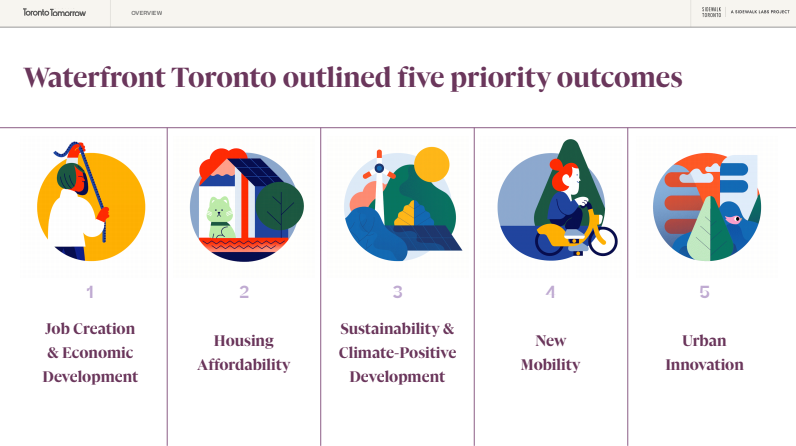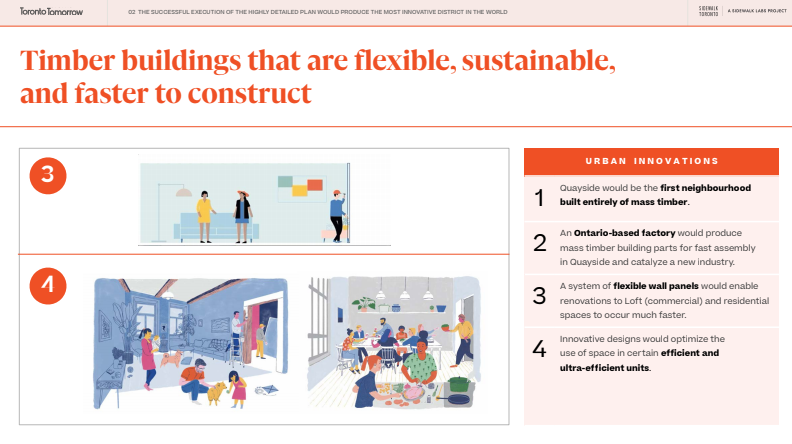5 takeaways from Sidewalk Labs' smart city master plan
The 1,500-page "Toronto Tomorrow" plan puts a $1.3
billion price tag on the project with the hopes of catalyzing $38
billion in investment by 2040.

Alphabet-owned Sidewalk Labs published on Monday its highly anticipated Master Innovation and Development Plan (MIDP) for Toronto's waterfront.
The 1,500-page draft, titled "Toronto Tomorrow: A New Approach for Inclusive Growth," details how the company plans to develop Quayside, a high-tech "neighborhood of the future."
The Sidewalk Toronto project has been teased for more than 18 months, drawing in comments and criticism from more than 21,000 Toronto residents and stakeholders, including the Waterfront Toronto organization. The master plan officially outlines developmental elements that have long been hinted at, such as weather-adapting technology and strategies for transparent data collection.
The master plan also puts a $1.3 billion price tag on the project with the hopes of catalyzing $38 billion in investment by 2040. The investments will enhance five priorities outlined by Sidewalk Labs: job creation and economic development; housing affordability; sustainability and climate-positive development; new mobility and urban innovation.

Credit: Sidewalk Labs
While there are thousands of details scattered through the lengthy report, Smart Cities Dive identified five key takeaways and observations:
1. Mass timber is at the core of the project A unique element of the MIDP is Sidewalk Labs' plan to develop the neighborhood of Quayside entirely from mass timber, a material that it says is "every bit as strong and fire-resistant as concrete and steel, but far more environmentally sustainable and easier to manufacture."
In order to make this a sustainable building process, Sidewalk Labs will invest $80 million in a tall timber factory in Ontario. Sidewalk Labs says this mass timber supply chain will create timber forestry jobs, factory jobs, trucking jobs and construction jobs.
The use of mass timber is also said to increase housing affordability; the Toronto Tomorrow plan estimates the development of 40% below-market units.
Credit: Sidewalk Labs
2. Data is woven into all elements of the plan....MUCH MORE
And from the BBC, June 26:
Google city sparks fresh controversy
Sidewalk Labs, a sister company of Google, has published its plans to build a smart city in Toronto, sparking fresh controversy.
In a 1,500-word document, the company laid out its ambitions to "improve the urban environment" with a variety of high-tech innovations.....MORE
Waterfront Toronto, the body that will decide if the bid is successful, has questioned the proposals.
Meanwhile, some citizens want the plans to be scrapped entirely.
'Lab rats'
The partnership between Sidewalk Labs and Waterfront Toronto was announced in 2017 and the plans to revitalise a disused part of the city was intended to be a model for future urban development.
But citizens expressed concerns about becoming "lab rats" and questioned Sidewalk Labs's motivations in building a city "from the internet up".
A group called simply Block Sidewalk held meetings to express growing concern about having a huge technology company making decisions about city life....
